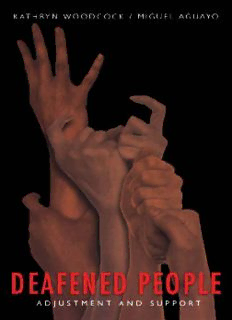
Deafened People: Adjustment and Support PDF
Preview Deafened People: Adjustment and Support
DEAFENED PEOPLE: ADJUSTMENT AND SUPPORT It is estimated that there are currently 1.9 million deafened people liv- ing in North America - individuals who could once hear naturally or with amplification but have become deaf and are now unable to rely on hearing to comprehend spoken information. Despite this vast num- ber, until now there have been few books that specifically address the process of adjustment to, and acceptance of, deafness as an adult. Kathryn Woodcock and Miguel Aguayo have addressed that situation with their unique look at deafness in Deafened People: Adjustment and Support. The authors demonstrate that deafness is not merely a medical con- dition; it is a social disability that affects the individual, the family, the social circle, and the work group. By describing the psychosocial expe- rience of acquired deafness as a process of adjustment, Woodcock and Aguayo demonstrate that acceptance of deafness is a process with practical, social, and emotional implications. To assist in that process, the authors have provided a guide to self-help techniques of proven value to deafened people. Drawing on their own experiences as deaf professionals, Woodcock and Aguayo explore such questions as how deafness occurs, how rela- tionships (professional and personal) can be affected by progressive deafness, and how and where to find peer support. Section 1 describes the process of adjustment, while Section 2 offers a practical guide to a successful method of establishing a self-help support network, with reference to such organizations as the Association of Late-Deafened Adults. Written in a lively, engaging style, the book combines medical background, professional advice, information on resources, and per- sonal examples. Deafened People: Adjustment and Support will be invalu- able for medical professionals and lay readers alike. KATHRYN WOODCOCK is Associate Professor in the School of Occupa- tional and Public Health at Ryerson Polytechnic University. MIGUEL AGUAYO is a registered social worker specializing in deafness - particularly acquired deafness - and other disabilities. A consultant to social service agencies on information technology and organizational change, he is currently a coordinator for the Ontario March of Dimes. This page intentionally left blank Deafened People Adjustment and Support KATHRYN WOODCOCK MIGUEL AGUAYO UNIVERSITY OF TORONTO PRESS Toronto Buffalo London www.utppublishing.com Kathryn Woodcock and Miguel Aguayo 2000 Toronto Buffalo London Printed in Canada ISBN 0-8020-4845-5 (cloth) ISBN 0-8020-8373-0 (paper) Printed on acid-free paper Canadian Cataloguing in Publication Data Woodcock, Kathryn Lee, 1956- Deafened people : adjustment and support Includes bibliographical references and index. ISBN 0-8020-4845-5 (bound) ISBN 0-8020-8373-0 (pbk.) 1. Deaf. 2. Postlingual deafness. 3. Deaf - Services for. 4. Self-help techniques. I. Aguayo, Miguel Oswald. II. Title. HV2380.W66 2000 362.4'2 COO-931736-8 The University of Toronto Press acknowledges the financial assistance to its publishing program of the Canada Council for the Arts and the Ontario Arts Council. University of Toronto Press acknowledges the financial support for its publishing activities of the Government of Canada through the Book Publishing Industry Development Program (BPIDP). To Ruby This page intentionally left blank Contents Preface ix Part One: Adjustment 1 1. About Late Deafness 3 2. Adjustment to Deafness 34 3. Effect on Relationships 65 4. Professional Help 90 Part Two: Support 141 5. Peer Help 143 6. Self-Help 161 7. Self-Help Leader's Preparation 173 8. Self-Help Rules 183 9. Self-Help Session Procedure 195 10. Helping Handwriting 206 viii Contents Notes 219 References 229 Index 235 Preface This book about deafened adults discusses acquired deafness (adventitious deafness, late deafness) from a new perspective: adjustment. Other books have described how deafness disrupts and perhaps even devastates the lives of adults who acquire the condition, but few have discussed the lengthy process of adjust- ment except in the form of biographies - and biographies, by their nature, are about people who are exceptional rather than typical. Yes, acquired deafness hinders relationships. Yes, those who acquire deafness are caught between the hearing and deaf worlds. Yet somehow, most people survive. The struggle, pro- tracted and arduous though it may be, eventually resolves itself in some degree of adjustment. That adjustment might be easier, and perhaps a little more successful, if more guidance was avail- able for deafened adults and for professionals. While we think our contribution makes a good start, we hope to see more research into specific supports for improved emotional adjust- ment. Till now, there has been too narrow an emphasis on the vocational adaptation and aural rehabilitation of this population. In this book, we describe acquired deafness and its impact, and present our model of the adjustment process. We then out- line different sources of help: professional help, peer help, and the most important - self-help. Although self-help has been a cornerstone of deafened adults' associations, there has not been a printed reference that deafened adults can consult to learn how to set up self-help support groups. The peer help and self-
Description: